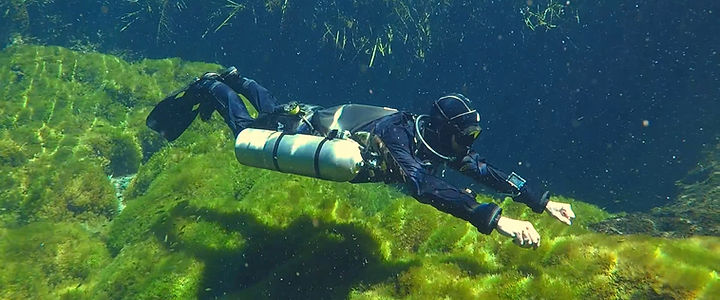
FAQs
Sidemount diving
When did it start?
Side mount is sometimes seen as a new trend, but it has in fact been used since the 60’s, when British cavers first used side mounted scuba cylinder to pass through flooded sumps.
How did it evolve?
The “English Style�” was adopted by Florida cave divers in the 70’s. They started to develop techniques and protocols for the safe exploration of flooded caves. A decade later, cave divers from around the World started to flock to the Mexican Riviera Maya, attracted by what was to become the largest cave exploration playground! Side mount evolved within this new cave diving community and several specific side mount systems and protocols appeared since.
What was its primary purpose?
The then new side mount configuration and techniques allowed cave divers to pass much tighter and restricted areas, and also in a much safer manner.
What is the Razor system?
It is without doubt the most accomplished side-mount specific system available. It has been developed during the last decade in the Mexican caves by englishman Steve Bogaerts. It represents the fruit of years of experience gathered while diving and exploring in the most demanding environments.
Where can I learn sidemount diving?
Today, almost every diving agency offers side mount specific training program, recreational and technical alike, in almost every dive location. Obviously, we advise to take your course with a specialized cave diving instructor, who will be able to prepare you for further education such as technical or cave diving courses.
Who can dive in a sidemount configuration?
For CDT Mexico, any 18 years old diver with at least 25 logged dives can undergo a side-mount diving training.
Does sidemount travels well?
The Razor system, as well as much or other systems on the market, is very light and compact. The rigging for the cylinders consists only on two aluminum clamps and two clips. It also solves the problem of the un-availability of twin-sets in most of diving centers around the world.
Is sidemount safe?
Side mount offers real gas redundancy by using two independent cylinders, preventing complete air depletion. It increases safety by protecting the valves and regulator first stages under the armpits, where they are visible and easy to reach, permitting a fast identification and handling of eventual equipment failures. It is not, as many suggest, safer than backmount, unless the sidemount diver is trained to an advanced level and is capable of breathing from the valves directly. Other than that, a backmount allows for breathing the gas from a cylinder with a failing regulator through the manifold. It is probably the most common failure, and desto makes backmount safer for most divers. Again, unless the sidemount diver is trained at an advanced level such as Advanced Sidemount or Advanced Cave Sidemoutn Diver.
Is it comfortable to dive?
The configuration is comfortable to wear as it releases the weight from the back and the hips. Also, it becomes easy to take off and put the cylinder back on, without removing the harness. This can be practical on the surface, but also very enjoyable underwater!
Which technical aspect might benefit from a sidemount configuration?
Mounting the cylinders on the sides will decrease the diver’s profile and water resistance. This will reduce the effort and the air consumption. By freeing the back of uncomfortable BCD’s and back-plates, divers become more flexible and mobile, which will in turn benefit their trim.
Can I carry one cylinder only?
The configuration is also versatile. You can carry a single recreational scuba cylinder, usually on the left side. You lose gas redundancy, but this is of course not an issue, as long as you’re diving with a buddy and within non-decompression limits.
How many cylinders can I carry?
The Razor system can carry up to six full on side mount and stage cylinders for cave and technical diving purposes.
More Questions?
Don't hesitate to contact us!
